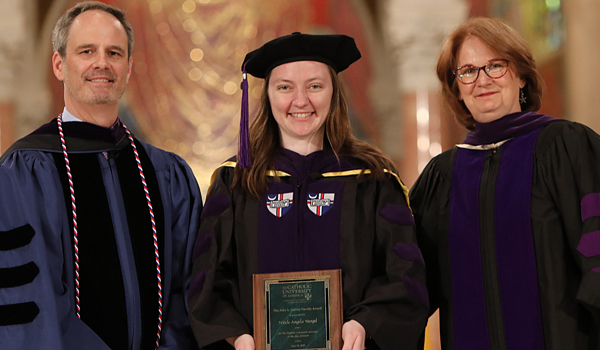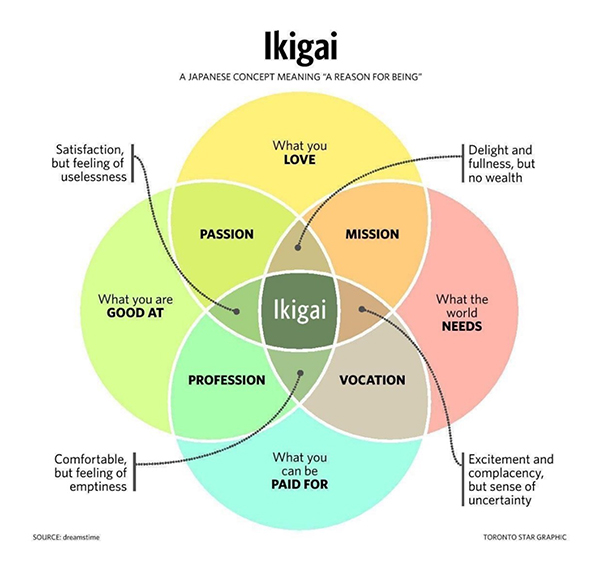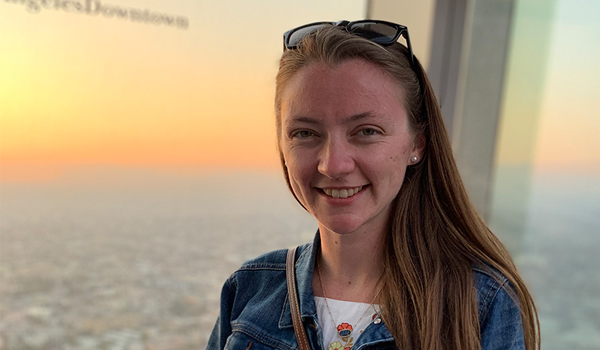The article below was an interview conducted by Maria Ott, Pro Bono and Public Interest Career Development Assistant Director at The Catholic University of America Columbus School of Law.
 I had the lovely opportunity to interview Nicole Wargel '23. Top of her class, I was expecting a stereotypical "legal eagle" with little time to spare. Instead, the first descriptive words that come to mind of this class' John L. Garvey Faculty Award recipient are: humble, down-to-earth, and kind.
I had the lovely opportunity to interview Nicole Wargel '23. Top of her class, I was expecting a stereotypical "legal eagle" with little time to spare. Instead, the first descriptive words that come to mind of this class' John L. Garvey Faculty Award recipient are: humble, down-to-earth, and kind.
Some brief context: Last fall, I attended the first-ever "Becoming a Legal Professional" workshop. This program is a series of workshops designed to provide 1Ls with an overview of the legal profession and practical guidance on career development. The Associate Dean for Student Affairs and Dean of Students, Katherine Gamelin Crowley, kicked off the series with an introduction to the Japanese word “Ikigai” meaning something akin to “a passion that gives joy and meaning to life.” A Westernized borrowing of Ikigai applies the philosophy to finding your ideal career, stating that four qualities are necessary to discovering your professional Ikigai: 1. Doing what you love; 2. Doing what you are good at; 3. Doing what you can be paid for; and 4. Doing what the world needs.

As the Assistant Director of Pro Bono and Public Interest Career Development, I was particularly excited to sit down and talk with a recent Catholic Law graduate who may have discovered her Ikigai through a life of public service.
What are you doing now that you have graduated from Catholic Law (other than the sobering exercise of studying for the bar)?
(laughs) I am studying for the bar but I have started my career working as a Legal Assistant at Christian Legal Aid DC (CLADC) where I have worked pro bono since my first year at Catholic Law. Specifically, I work in their criminal record sealing section which involves meeting with clients, filtering what charges are eligible for sealing, and working with licensed attorneys to draft motions and correspond with the local courts. Upon passing the bar, my goal is to transition into a staff attorney role and I am looking forward to being able to advise clients completely on my own! For now, it is rewarding to actually be able to answer some general client questions and I am surprised by all the substantive knowledge I have accumulated from the many cases I have read over the past three years at law school!
Do you think you have found your Ikigai, at least for the time being?
I am happy to say that I definitely think so! That said, I have a feeling my Ikigai will evolve into policy work after a few years of law practice.
Let’s break down the “elements” of Ikigai and determine together if you meet them.
Element 1: Are you doing What You Love?
Yes! I wake up each morning looking forward to my work at CLADC for multiple reasons. First, I am passionate about DC record sealing law. I came into law school thinking I wanted to do progressive prosecution or defense but found that to be too draining day to day. The idea of being a part of giving someone a renewed accessibility to the opportunities life has to offer is quite rewarding.
I also love meeting with clients. There was a time when I used to be more hesitant to make client calls because I did not know all the ins and outs of the law, but now it’s my favorite part of the day! It is a unique privilege to make deep connections with the community in ways I wouldn’t otherwise.
Also, work-life balance is crucial and my job provides this. For me, Ikigai is not just something I achieve through my work but through my life as a whole. It’s imperative that I feel fulfilled throughout my day.
Element 2: Are you doing What You Are Good At?
I think so. After much time spent getting to know the law, I can now rattle off pertinent DC law right off the top of my head! But this didn’t come easily and I persevered because I was driven by my passion for meeting the clients’ needs. I have now analyzed eligibility for over 100 clients and see that the trick to improving in the practice of law is to keep throwing myself into the nuances until they no longer stump me. Of course, once new legislation goes into effect, much of what I have learned will change and I will have to start all over again. I am up for the challenge!
Element 3: Are you doing What You Can Be Paid For?
Yes, thankfully.
You must really love what you do because it is no secret that the non-profit path is not the most financially lucrative.
I can’t stand the thought of doing something if I don’t love it and I tend to stray away from a career path that revolves around a subject matter I am not interested in, no matter what the pay. My need for personal fulfillment is too strong. My outlook is that if I spend my days, hours, and minutes doing something I am truly passionate about, my work will build on itself and lead me to even greater fulfillment, including financial fulfillment, in the years ahead.
What advice do you have for students who want to practice in lower-paying settings but choose not to because of looming student loans?
There are a lot of creative options for repayment out there. Plus, the money will come eventually and, in the meantime, you can actually enjoy your life since you are already doing what you love. Also, if you are truly passionate about your work, it will likely grow into something more lucrative. For sure, following a public interest career path at a non-profit is much easier said than done. I get that it's difficult. So, if you simply cannot take a full-time public interest job for financial reasons, you could fill the void and desire to do this type of work by carving out a few hours a month doing what you love pro bono until it turns into something well-paying.
Element 4: Are you doing What The World Needs?
I hope so. Well, at least I am doing what I think the local community needs and then hopefully someday I will expand my outreach further.
Congratulations! It looks like you have met all four elements of professional Ikigai!
What inspired you to follow the public interest path?
You could say community service runs in the family! My dad was in the military so my family and I moved around a lot as I was growing up and it was a family “habit” to volunteer for the community wherever we went. Before attending law school, I served at AmeriCorps for 2 years where I worked in the DC public school system as an academic and behavior coach. During that time, I made observations related to family and education law that I did not have either knowledge or authority as a coach to address so this prompted me to go to law school with a public interest perspective.
What are your career goals?
I feel like I have some …but then I forget them! Maybe I will start my own practice but maybe not? Honestly, career goals are really not my main focus. My priorities are loyalty to self, family, and community and I am a big proponent of work-life balance. I can’t necessarily see myself working the hours required in a big law firm! I want to be in control of my life and that means I want to fit work into my life as opposed to fitting my life into someone else's schedule.
Is there any other advice you would like to impart on the next generation of law students?
If you are interested in something, take a break from your reading assignments and volunteer! Try things out that pique your interest as early as possible and as much as possible. You might be surprised by what you find. You know, I began by signing up for a pro bono clinic with CLADC in the winter of my 1L year and never thought it was going to turn into what it has.
***
 After the interview, I asked Ms. Wargel to share with me her most inspiring quotes. They were gems such as John 8:7 “He who is without sin among you, cast the first stone at her,” which goes to not judging your clients who have been dealt a rough hand; and also the concept of “Ubuntu” meaning “I am because we are” which goes to Ms. Wargel’s belief that human beings are social creatures who form our identity based on relationships and how we treat each other. However, in the spirit of Ikigai, I would like to end by using Ms. Wargel’s own words:
After the interview, I asked Ms. Wargel to share with me her most inspiring quotes. They were gems such as John 8:7 “He who is without sin among you, cast the first stone at her,” which goes to not judging your clients who have been dealt a rough hand; and also the concept of “Ubuntu” meaning “I am because we are” which goes to Ms. Wargel’s belief that human beings are social creatures who form our identity based on relationships and how we treat each other. However, in the spirit of Ikigai, I would like to end by using Ms. Wargel’s own words:
“Focus constantly on your core values and you will be happily surprised!”
